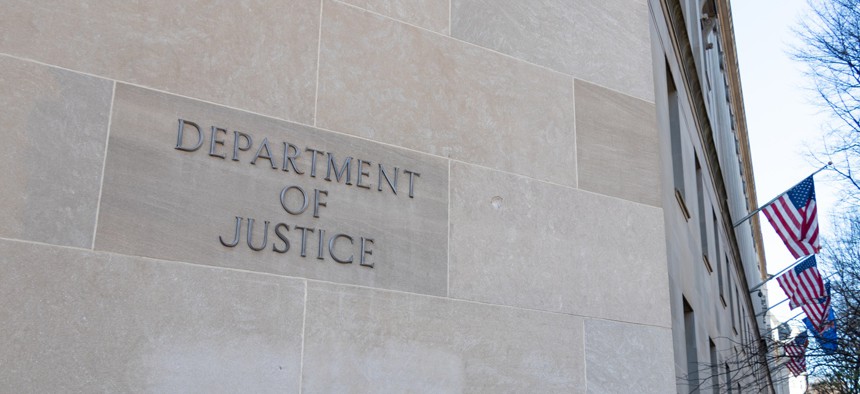
Attorney General Pam Bondi called the use of subpoenas or warrants to target journalists’ sources an “extraordinary measure” and suggested her department must take several steps before such actions would be approved. The Bold Bureau / Getty Images
Justice Dept. rescinds rules safeguarding media from government seizures
The rules, first issued under former Attorney General Merrick Garland, gave members of the press protections from legal mechanisms to obtain sensitive data linked to their reporting.
Attorney General Pam Bondi on Friday reversed a Biden-era policy that prevented the Justice Department from seizing reporters’ communications, notes and interviews through subpoenas or court orders as part of efforts to uncover confidential sources that leak agency information, according to an internal memo obtained by Government Executive.
The move, meant to clamp down on leaks of sensitive details that “undermine” Trump administration efforts, could give the Justice Department more leeway to prosecute journalists.
“This Justice Department will not tolerate unauthorized disclosures that undermine President Trump’s policies, victimize government agencies, and cause harm to the American people,” the memo says.
It adds: “Accordingly, under the revised regulations implemented today, the news media ‘must answer subpoenas’ when authorized at the appropriate level within the Department of Justice.”
Under the new memo, Bondi herself must “approve efforts to question or arrest members of thew [sic] news media.”
The memo specifically targets federal workers who leak information to reporters.
“Federal government employees intentionally leaking sensitive information to the media undermines the ability of the Department of Justice to uphold the rule of law, protect civil rights, and keep America safe,” Bondi wrote. “This conduct is illegal and wrong and it must stop.”
Bondi called the use of subpoenas or warrants to target journalists’ sources an “extraordinary measure” and suggested her department must take several steps before such actions would be approved.
The Justice Department did not immediately return a request for comment. The memo was first reported by ABC news.
One Justice Department employee said the memo was sent out to the agency’s workforce without any additional context, characterizing it as “just out of the blue.”
The department recently clamped down on employees’ use of social media, including an order preventing them from sharing even public press releases.
“I find it ironic that they claim a concern about the rule of law when all recent actions indicate a practice of ignoring the rule of law when convenient for the administration’s agenda,” the same Justice employee said. “It’s clear that the administration is afraid of anyone finding out about what the government is doing.”
Garland’s policy was issued in 2021, with revisions put out in 2022.
“Because freedom of the press requires that members of the news media have the freedom to investigate and report the news, the new regulations are intended to provide enhanced protection to members of the news media from certain law enforcement tools and actions that might unreasonably impair newsgathering,” he said at the time.
One avenue for prosecuting journalists is the 1917 Espionage Act, though it has never been successfully used to prosecute a reporter for publishing classified information. While the government has brought Espionage Act charges against federal employees and contractors who leak to journalists, it has consistently stopped short of prosecuting members of the press themselves.
In 2010, under the Obama administration, the Justice Department named Fox News reporter James Rosen a co-conspirator in an Espionage Act leak investigation involving North Korea. Although Rosen was never charged, Justice used the designation to secretly obtain his emails and phone records.
The Espionage Act prosecution of WikiLeaks founder Julian Assange presents arguably the most significant challenge to traditional journalistic protections to date. The U.S. has charged Assange for publishing classified military and diplomatic documents, a move critics argue risks criminalizing routine national security reporting.
More recently, several Defense officials were ousted in connection with an investigation into media leaks at the Pentagon, though they maintain they did not disclose classified information. Director of National Intelligence Tulsi Gabbard said Wednesday that she made two criminal referrals to the Justice Department alleging leaks in the intelligence community.
In response to the recent memo, Freedom of the Press Foundation Director of Advocacy Seth Stern called out lawmakers who put the PRESS Act — which passed the House but not the Senate in the last Congress and would have prevented the federal government from compelling journalists to divulge certain information except in limited circumstances — "on the back burner."
"Everyone predicted this would happen in a second Trump administration, yet politicians in a position to prevent it prioritized empty rhetoric over putting up a meaningful fight. Because of them, a president who threatens journalists with prison rape for protecting their sources and says reporting critically on his administration should be illegal can and almost certainly will abuse the legal system to investigate and prosecute his critics and the journalists they talk to," he said.
Editor's note: This article has been updated to include comment from the Freedom of the Press Foundation.
How are these changes affecting you? Share your experience with us:
Eric Katz: ekatz@govexec.com, Signal: erickatz.28
NEXT STORY: NSF director resigns






